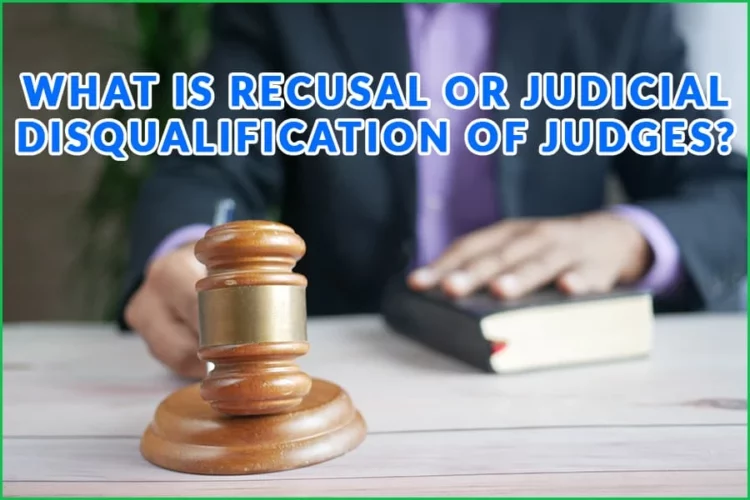You might be hearing the legal terminology “recusal or judicial disqualification for the first time. Well, both terms mean the same thing.
The judicial system boasts a code of conduct for judges, magistrates, or justices. These codes of conduct guide the judiciary system and ensure judgments are passed without bias.
Now, let’s address the question below.
What is recusal or judicial disqualification of judges?
Have you ever witnessed a court case where the defendant or prosecution accuses the judge of partiality for one or more reasons? It happens now and then.
The defendant or prosecution may have several reasons to believe a judge might be biased in his judgment.
So, what does recusal or a judge’s judicial disqualification means?
It’s a process where a judge decides against getting involved in a case they would have otherwise helped resolve. Recusal is necessary where a judge cannot maintain impartiality.
The Position Of The United States Constitution On Judges’ Recusal or Judicial Disqualification
You can consider a judge’s disqualification a necessary step in a case where partiality is inevitable. The United States Constitution encourages judges to seek recusal in certain circumstances.
According to the U.S. Constitution’s Due Process clause, judges have to recuse (disqualify) themselves in two scenarios:
#1: The first scenario hints at the judge’s financial or personal interest in the case’s outcome. There’s a possibility of partiality in the said judge’s judgment.
#2: There’s a strong indication that the judge will be biased.
So, it is constitutional for judges to disqualify themselves from court cases. And yes, a robust recusal standard is vital for unbiased decision-making in the United States judiciary system.
Instances Of Judicial Disqualification In The Supreme Court Cases
There have been several cases in the Supreme Court where justices disqualified themselves from cases. Recusal still happens to date, as it’s a vital tool in preventing judicial misconduct.
Justice Sandra Day O’Connor was one of the justices in the U.S. judiciary system that chose the part of recusal in a case involving telecommunication companies.
Justice Sandra’s reason for removing herself from the cases was because she owned stocks in the firms. So her judgment would have favored the telecommunication firms. Why? She would want to save the firm and indirectly protect her financial interests.
Justice Stephen Breyer was another high-profile judge that embraced judicial disqualification. He decided to recuse himself in cases involving insurance companies. Why? It was because of his personal interest.
There have also been several instances where justices disqualified themselves from cases because their children happen to be lawyers representing one of the parties.
What Punishment Can Judges Face For Refusing Recusal Or Judicial Disqualification?
Judicial disqualification or recuse are steps judges must take to prevent judicial catastrophes. The damage a partial judgment can cause is unimaginable.
The United States Constitution clearly states the conditions under which a judge should seek judicial disqualification or recuse. Failure to take the right steps could lead to punishment.
So, judges with the proper grounds to disqualify themselves from a case are expected to take such action.
However, if a judge doesn’t recognize that grounds for him to recuse exist, then the error becomes harmless. In other words, the judge won’t face any punishment, and there won’t be a retrial of the case.
On the other hand, if a judge fails to disqualify themselves from a case when they should have known such was necessary, such judge will face punishment.
Though punishment for refusing to recuse varies by jurisdiction, judges that defaults may face sanctions.
There’s also a chance an appellate court may set the judgment aside and retry the case. Certain jurisdictions may take such an action when the judge that handled the case should have disqualified themselves but failed to do so.
Conditions For Recusal Or Judicial Disqualifications
The law has provided conditions under which judges are expected to remove themselves from cases. Recusal, or judicial disqualification, is universal. But the details or conditions for judges to recuse themselves may vary across the globe.
So, here are conditions under which judges should consider disqualifying themselves from cases.
#1: The judge happens to be a witness in the case. So, unless the accusation is false, judicial disqualification is essential.
#2: The judge in question prepared the legal document presented during the case. The document could be a will or contract, whatever the case may be.
#3: When the judge determines it’s impossible to act impartially in the case.
#4: When the judge has a financial or personal interest in the case’s outcome, recusal is essential. However, the law’s position on this varies by jurisdiction.
In some jurisdictions, recusal is essential when the interest exceeds a certain value. Some jurisdictions require judicial disqualification if the judge has any interest at all.
#5: The judge has previously represented one of the parties in the case as an attorney or in other capacities.
#6: The judge has a relationship with one of the attorneys, party, or spouse.
How Can You Disqualify A Judge From A Case?
Having a partial judge preside over your case is dangerous, and against judicial ethics.
However, both the prosecution and defense have the privilege to pursue a judge’s disqualification if they have reasons to believe the judge cannot preside over the case with impartiality, as enshrined in the judicial code of conduct.
So, you have the right to file an affidavit detailing facts relating to any perceived or implied prejudice or bias, which satisfies the requirement to remove the said judge from the case.
A certificate directly from the attorney of records has to accompany the affidavit. It must state that the affidavit filed by the defendant or prosecution is not interposed for the delay and has been filed in good faith.
The time set for filing such an affidavit might vary from one jurisdiction to another. But in general, it is usually within 20 days before the actual date set for the case’s hearing or not less than three days before any pretrial matter hearing.
Here’s what happens when you file a motion seeking to disqualify a judge from a case. Firstly, a copy of the said affidavit goes to the judge.
The judge must respond to the motion seeking to disqualify him from the case two days after getting a copy of the affidavit.
The judge can respond to the motion seeking to disqualify him from the case in two ways. He can either transfer the case to another judge or file a written response to the affidavit with the clerk.
The judge can admit there’s possibility of conflict of interest or bias and provide more information that justifies the disqualification.
If the judge denies the allegation and challenges the disqualification, then another judge would be brought in to decide the matter.
Conclusion
What is recusal or judicial disqualification of judges? It refers to a judge’s removal from a case. Judges might decide to disqualify themselves from cases. Prosecution or defendants can also file for a judge’s removal if they deem fit.
However, you can’t seek a judge’s removal from a case just because you don’t like the judge’s face. You can only seek a judge’s recusal where there’s evidence that the judge has a conflict of interest or will be biased.
Judicial ethics demands that judges should disqualify themselves from cases where partiality is a possibility. Failure to seek recusal is a crime and it might attract punishment. An appellate court may also retry the case.










